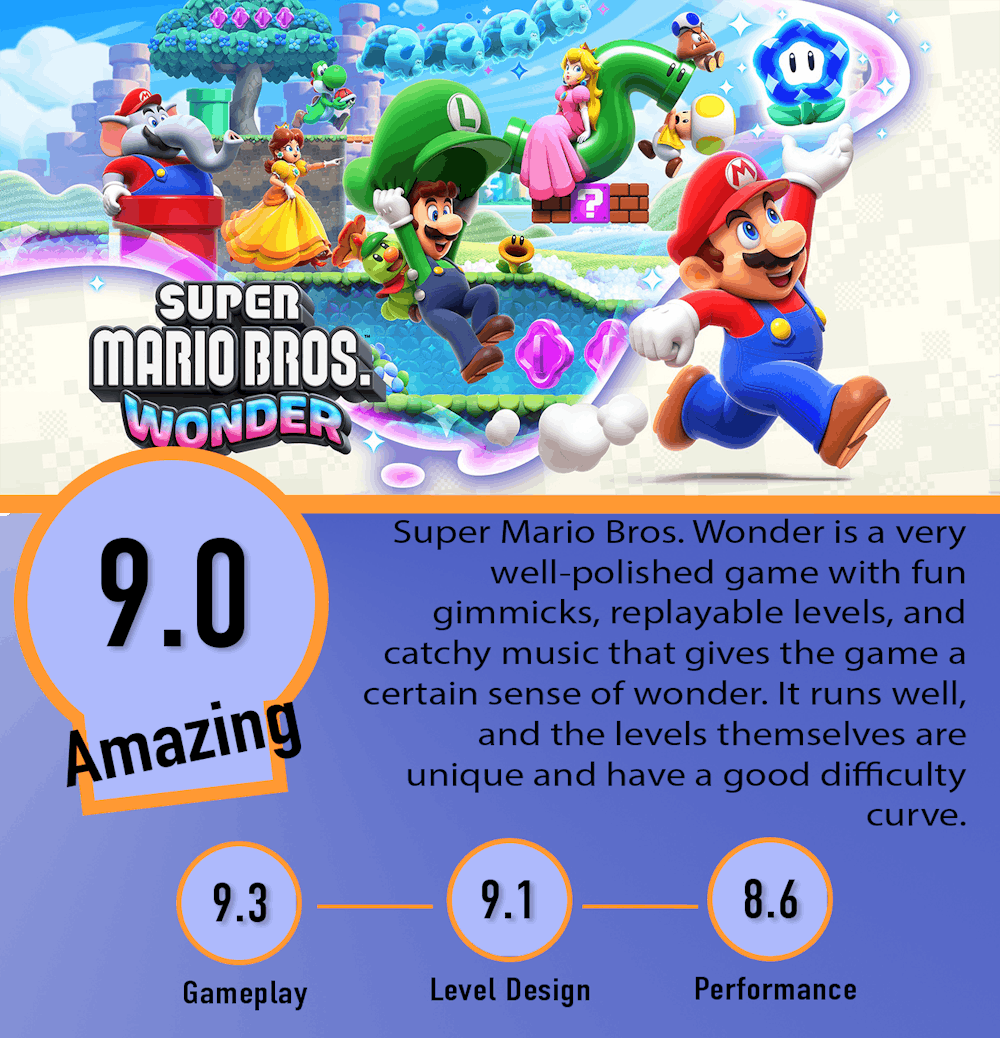The opinions and views expressed in this article are those of the author and do not reflect the opinion of Byte or Byte’s editorial board.
Reviewed on: Nintendo Switch (digital download)
Most everyone knows Mario (made by Nintendo) as one of—if not the most—recognizable gaming franchises in the world. From its inception in the form of Super Mario Bros for the Nintendo Entertainment System (NES), to the latest release of Super Mario Wonder, the games have been built around their platforming challenges and colorful environments. There have been many Mario games, but after the original three for the NES as well as Super Mario World, the games started focusing on 3D until their return to the classic style in the form of New Super Mario Bros. Four games in the series were made, and the next evolution for 2D Mario seems to be Mario Wonder. I've played my fair share of Mario games, especially the 2D ones. I grew up with the New Super Mario Bros game for the Wii and DS. I played two for the 3DS a little down the line, played both the ones for the SNES and NES on the online Nintendo Switch service, and recently played Super Mario Bros U Deluxe on the Switch earlier this year. I had plenty of fun times with friends and family, playing through the levels spread throughout these games. When Super Mario Wonder was released, I thought that it was going to be another game in the New Super Mario series, even with the art style change. I thought nothing much about it, but when they started showing gameplay—which boasted a bunch of new power-ups and elements—I began to get excited with the knowledge that it didn't look exactly like the rest of the New games. It was then revealed not to be in that series at all. I bought the game through preorder and told myself I'd take my time to play it. However, I ended up speeding through the game over a single weekend. How does this game stack up with the rest of such a prolific series, though?
Wacko Gameplay and Gimmicks
The game takes place inside the realms of the Flower Kingdom rather than the Mushroom Kingdom. There are six worlds in total, all with gimmicks pertaining to that environment. In these six worlds, there are brand new power-ups to be found. Mario can transform himself into simpler forms like fire or ice from regular shrooms, but by finding a wonder flower, he can become things like a spike ball, or he can fill the screen with mini Marios.

Taken from NPR
Mario can gain the ability to turn into a goomba as well as a stretchy version of himself that can move up and down. He can affect the game’s gravity and camera perspectives. He can create a dance party consisting of singing enemies and change the background to a dark, red color scheme similar to the sunset background of some Donkey Kong Country levels. All these power-ups are new—amongst others—and haven't been shown in trailers, but are a hoot to discover and play around with. Alongside these new powers, there is a new badge system where, using purple coins you've collected on your journey, you can pay for badges that give you more permanent abilities, such as a triple jump timed to the rhythm of a level's song, a grappling hook in the form of a piranha plant, a gliding leap, and many more. The new mechanics aren’t the only thing that shows off the “wonder” of this new Mario title, which has many different random things built into the levels that stand out from previous games. This includes having to ride sheep across a stage or having a snowball knock off a flagpole, causing the stage to go on longer than it was initially concluded to.
A "Level" of Wonder
Each level of Wonder is creative and unique. You have levels where you have to jump your way across falling platforms and time your jumps on swinging platforms to ensure you don't fall into a pit. You'll be in situations where you need to climb to reach certain heights and ride across moving platforms. You'll have to bounce on obstacles and enemies to reach inaccessible platforms you can't with plain jumps. Running and jumping from platform to platform and stomping on enemies to reach the flag has been the premise of every 2D Mario game, and it is nothing different here except for the more surprising gimmicks this game throws at you. There are also new enemies unique to each location. The environments of the levels are diverse.

Taken from CNN
You have levels set among flower and grassy landscapes, ones set underwater, up in the clouds, in a bog filled with lava, or inside haunted houses and castles. With plenty more levels, the vast diversity gives the game a fresh visual feel. The bosses in the game present are unique as they use the wonder seed to transform, where you have to survive a specific time limit until the effect wears off. Throughout the levels, you can play ten different characters with very minimal differences in how they are controlled, which can make levels easier or harder depending on the layout. The implementation of this many characters enables the option to play multiplayer, which has been in all the console 2D Mario games minus the handhelds. They even include things in multiplayer modes where you can see where people died and how/why with talking blue flowers that are present throughout the game.
Peachy Dreams in Presentation and Performance
As I mentioned before, the game is very visually appealing; the most of any 2D Mario game. I also thought the performance was pretty good, considering all the things that are on the screen at one time in some of the levels. Heck, even how they implemented online multiplayer was surprisingly not that bad. It ran smoothly. I liked how the world map was laid out, which was similar to Super Mario 3D World, in which it was free to roam. I think the levels are super colorful, and the cutscenes that play are cute. The music that is played through the levels helps to represent the whimsical atmosphere presented in the game's levels and world map.
The End of a Wonderful Dream
Overall, this game is entertaining and is one of my favorite, if not my favorite, 2D Mario game to come out. The $60 price point is, I think, fair for all the content you get with the game. It's replayable. It keeps the formula of platforming through levels to reach Bowser and save a captive. However, the wonder seed and flower gimmicks really make the game feel much more advanced than other 2D games, as well as the change in art style. I can't wait to see what direction Nintendo goes next with the next 2D Mario game.

Sources:
Nintendo, Nintendo, Nintendo, Nintendo, Mariowiki, Mariowiki, Nintendo, Mariowiki, Nintendo
Photos:
Contact Cameron Tyo with comments at cttyo@bsu.edu.





The Daily News welcomes thoughtful discussion on all of our stories, but please keep comments civil and on-topic. Read our full guidelines here.